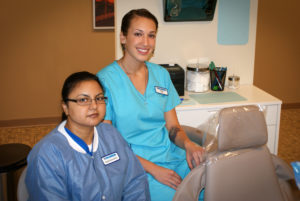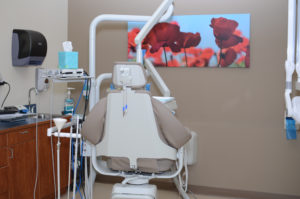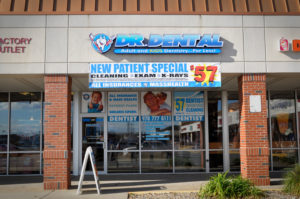
There’s a huge difference between regular, routine teeth cleaning and deep cleaning (scaling and root planing). Periodontal disease causes harmful bacteria that can even destroy your jaw bone and other nearby structures and in extreme cases lead to tooth loss.
Preventive cleaning from a dentist guarantees a healthy mouth. It should be typically performed after every six months. A detailed dental health evaluation is performed at each visit and gum tissue is measured for assessment. The dentist uses a diagnostic tool known as the periodontal probe.
All measurements within the 1-3mm range without any bleeding imply that no active disease is present. However, in cases where inflammation or bleeding is present and the depth is above 4 mm, pockets begin to form as the bacteria make the gum tissue to pull away from the tooth.
Deep cleaning is often dreaded and with a comprehensive dental process, a little apprehensive is understandable. However, deep cleaning that usually involves scaling and planing is painless and less complicated than people think.
Who Needs Deep Cleaning?
According to The American Academy of Periodontology, every adult must get a periodontal assessment every year for determining whether additional treatment is required. Whether pockets become deeper than 5 millimeters, the dentist might recommend a deep scaling and root planing appointment.
When both tartar and plaque are left untreated for a long time, bacteria begins to breed and could easily affect the gum. This leads to gingivitis that develops into a periodontal pocket, inflicting more damage to the teeth. Patients with chronic gum diseases are recommended to have deep cleaning to avoid serious consequences, such as teeth loss.
Signs and Symptoms of Gum Diseases
Gum disease is painless, but it is important that you seek treatment after experiencing the following symptoms:
• Tender, red, bleeding or swollen gums
• Gums receding from the tooth
• Bad breath
• Loose teeth
• Pus surrounding gums and teeth
The Procedure
When you know what exactly is going to happen, the patient is more relaxed during the procedure that comprises of a few steps.
Examination
Before the actual cleaning process, the dentist examines your entire mouth. The dentist will use a small mirror to check around your gums and teeth and for any signs of gingivitis (inflamed gums). After analyzing all the problems that need to be corrected, the dentist proceeds to the cleaning process or gives you another appointment for deep cleaning.
Tartar Elimination
The dentist uses the small mirror and a scaler for eliminating tartar and plaque between the teeth and around the gum line. You will hear scraping, but this is normal! The time required to scrape a particular spot depends on the amount of tartar present.
Toothpaste Cleaning
When the teeth are tartar-free, the dentist brushes it using a high-powered electric brush. This makes the grinding sound most people dread. Professional cleanings utilize toothpaste that tastes and smells like an ordinary toothpaste. However, the dentist gently scrubs the teeth with a granular consistency.
Flossing
Professional flossing thoroughly cleans between the teeth and locates trouble spots where gum bleeding occurs. The dentist flosses your teeth to remove any plaque that is left over.
Rinse
Generally, the dentist uses a rinse containing liquid fluoride to rinse your mouth.
Fluoride Treatment
The cleaning process usually ends with a fluoride treatment which serves as protection to help teeth combat against cavities for several months. A foamy gel is usually left on your teeth for a minute.
Other Elements of Deep Cleaning
Professional teeth cleanings should be performed twice a year, and X-rays should be carried out yearly. To know whether you need more dental treatments, going back for dental checkups will help prevent any major problems.
When the pockets are not too deep, you will experience no or little discomfort during the procedure and it can be done without numbing. The only feeling may be the physical scraping along the teeth as the area is smoothened. A planed root surface that is free of tartar has a good chance of healing better. After deep dental cleaning, some deep gum pockets can be reduced to a great extent.
The depth of the pocket and the condition of the root surface helps to let the dentist decide whether the area should be numbed or not. If you experience any pain or discomfort, don’t hesitate to discuss it with your dentist.
Oraqix is also used with deeper pocket cleaning as a substitute to injectable anesthetics. This is an exclusive non-injection device for delivering topical anesthetic gel into the gum pockets to avoid numbing the tongue or lips as it can happen with injected local anesthetics.
Benefits of Deep Cleaning
In most cases, swollen or red gums and tissues become pink and firm again. Pockets become smaller and any previous bleeding gets reduced. Other advantages of deep cleaning are:
Disease Prevention
Deep dental cleaning aids in preventing diseases that are an outcome of proliferation of bacteria. Eliminating all plaque, calculus and tartar will fight infections and help prevent them.
Stops Deterioration of Teeth
Once all bacteria are successfully removed, the risk of tooth loss and gradual deterioration of teeth is reduced.
Overall Good Oral Health
Dental deep cleaning must be an element of a complete oral health package. Apart from drinking enough fluids, good brushing habits and regular flossing, you should avoid sugary snacks and smoking.
Care, after Deep Cleaning Appointments
Practicing good cleaning habits after deep cleaning will help maintain good oral health. Brush twice a day using a soft nylon brush with fluoridated toothpaste. Using good mouthwash and medicated toothpaste helps control tartar build-up. Always choose ADA-approved products. Using a reputed mouthwash is also recommended. You should follow a diet that is rich in vegetables and citric acid.
How Much Does Deep Teeth Cleaning Cost?
Nearly 85% of the adult population experiencing symptoms of gum diseases require deep cleaning. The average price for deep teeth cleaning is around $180-$300 per quadrant.











